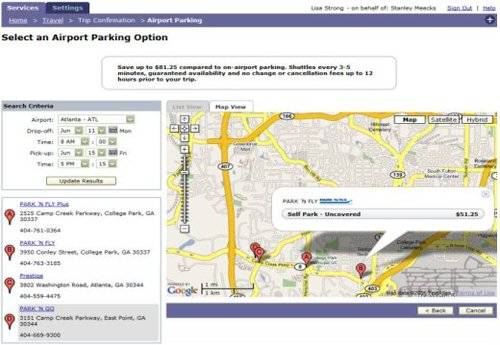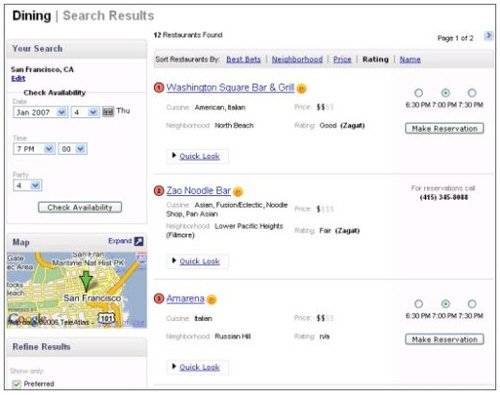I have written a few framework articles
recently, defining Web 3.0 and Enterprise 3.0. I also wrote a piece
towards the end of 2005, called What is this
Sea Change? In this article, I am going to start coverage on a very interesting
company called Rearden Commerce, which
touches upon many of the concepts we’ve discussed in the 3 pieces referred above.
(I recommend you read the framework pieces first, before reading the rest of this
story.)

Rearden is a services marketplace that consolidates various service providers (Travel,
Dining, Conferencing, Shipping, etc.), and offers it to the employees of an Enterprise.
It is a very well funded company, with $100 Million investment, and was featured
in Business 2.0’s
25 startups to watch list at the end of 2006. Rearden Commerce’s business model is
subscriptions and it currently has over 200 customers.
An Example
Let me explain this to you by using a scenario. The tool that an employee uses is
called the Rearden
Personal Assistant, which is a web app that helps users find and manage all the
services available to them via Rearden’s network.
Let’s say, for example, that I am an employee of Pfizer and that Pfizer is a client of Rearden (which
it is). Rearden has a network of 135,000 service providers, many of whom have negotiated
preferred rates with Rearden. In addition, in some cases Pfizer has negotiated its own
preferred rates – and the Rearden system can be configured to use those rates as
well.
So say that I am planning to go to a conference next month in New York. [Context]
I start my travel planning – airline, hotels, limo to/from JFK. I also plan where I
want to eat, what shows I want to see, etc. When I log into the Rearden “Personal
Concierge” system, it knows my profile and the human resource policies of Pfizer
for me (e.g. I am not allowed to travel First or Business Class).
Airport parking

The company has certain negotiated preferred rates with 5 mid-town hotels. If I need
to ship packages during my trip, I have to use Fedex – the preferred rates for that are
in the system. I have to also make arrangements for 3 online meetings while I am there,
and Pfizer has preferred rates set up with Webex. [Policy Propagation]
My “Personal Concierge” also knows that I like Jazz and Blues, so it
recommends clubs where I can go to listen to my favorite bands. [Personalization]
It also gives me restaurant reviews from Zagat in the neighborhood where I will be,
and which are consistent with my food preferences. It provides relevant Google Maps and
Rewards Network discount coupons. [Content]
Restaurants

How it works
All of this is powered by a SaaS platform from Rearden Commerce, architected with the
philosophy of User-Centric Computing. It provides Identity-based, User-centric
personalization. It uses native web services and a Service-Oriented Architecture (SOA),
and provides a mashed up user experience that is extremely CONTEXTUAL.
If you recollect the Web 3.0 model,
Rearden already has an excellent Context, Personalization, Commerce, and Content
integration. I haven’t checked their Vertical Search capabilities yet, but it
should be a natural extension of their offering.
What it lacks, however, is Community. I would like to also coordinate plans
with my cousin in Manhattan, and a couple of friends, as well as meet some Swing dancers,
so that we can all go dancing together. All of this should automatically get logged into
my calendar, my PDA, etc.
Now, if you recollect the Enterprise
3.0 model, Rearden certainly hits the spot on both SaaS and the Extended Enterprise
trends.
Finally, in the Sea Change piece, I
discussed the possibilities for B->B->C Contextual Advertising. Rearden Commerce is
well-positioned to draw upon its platform and extend it to include an Advertising
Management System.
Conclusion
Bottom line, I really like what I see in this company – and it has a lot of
possibilities. It also aligns with the still fairly open opportunity of leveraging the
SME markets and pulling them into relevant consolidated marketplaces. By providing, say,
restaurants with a consolidated contextual market channel through Rearden, it can also
start tapping into the marketing budgets of these restaurants.
All in all, Rearden demonstrates that Context is a really powerful
organizing principle!
Sramana Mitra is an Entrepreneur, Founder CEO of 3 companies, Strategy Consultant
to 50+ companies, and Author of a popular technology business blog, Sramana Mitra on Strategy.





















